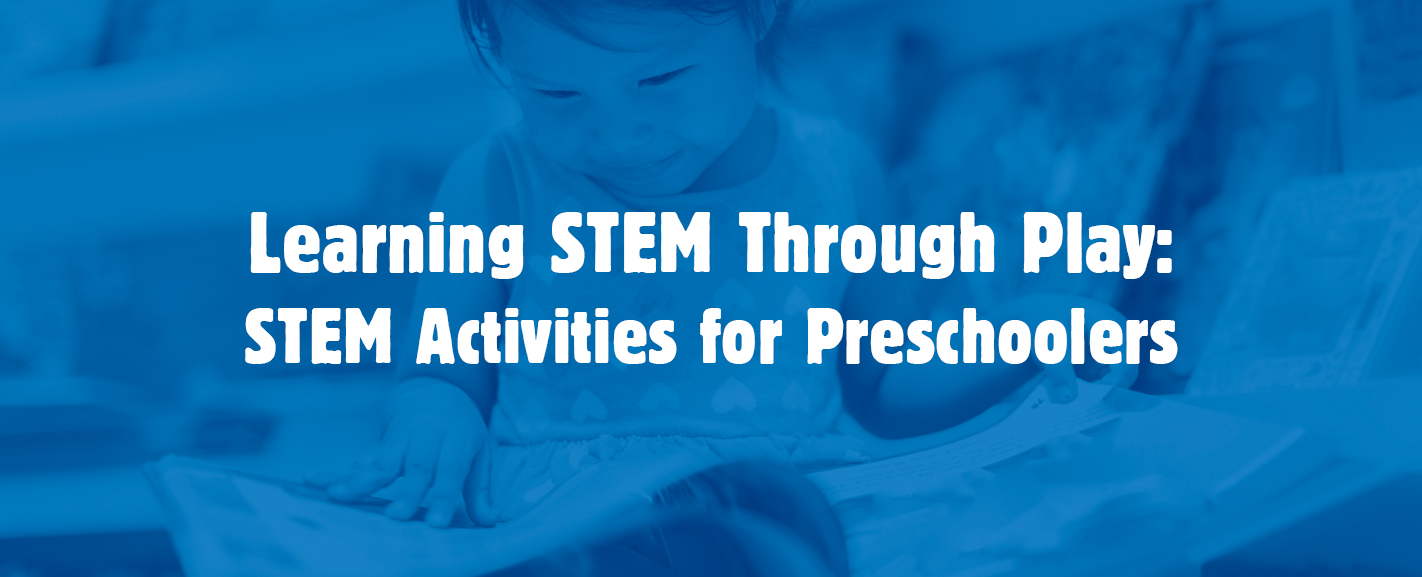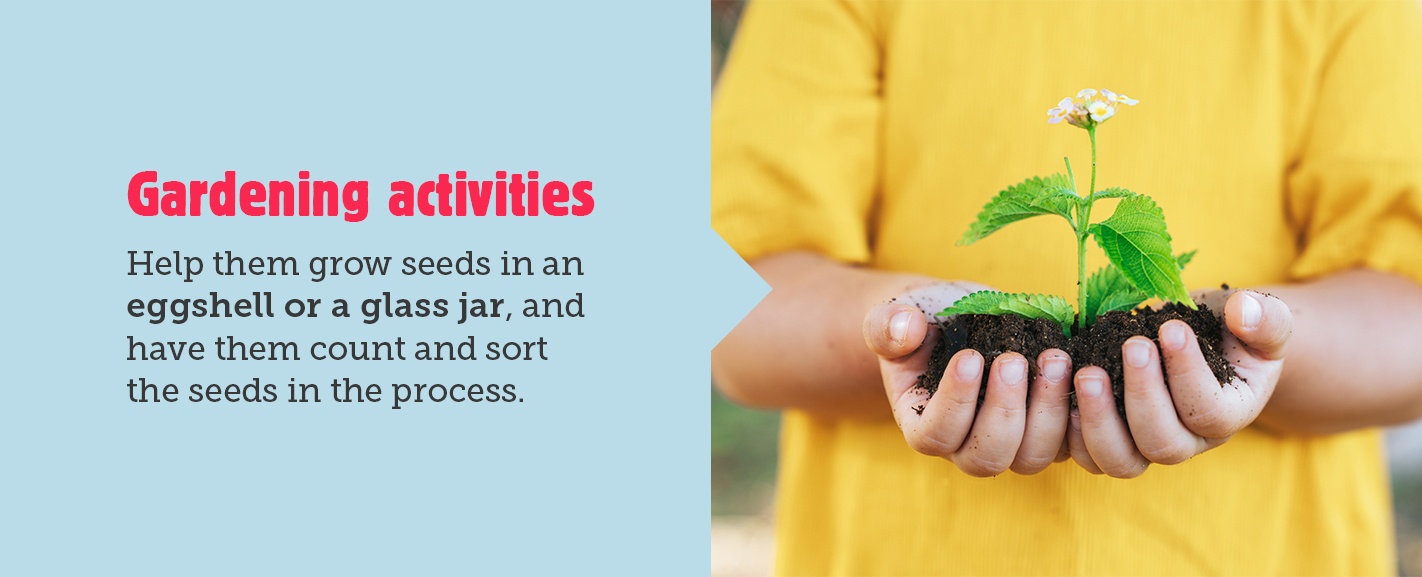
Education goes beyond the four walls of the classroom. Many parents and educators are embracing methods, such as STEM play, to help kids establish helpful thinking patterns and learn lifelong skills.
STEM education refers to learning science, technology, engineering and math. STEM study also includes computer science education. Learning about STEM through play doesn’t only teach the principles of these subjects to children — it also frames each area of study and helps a child put it into real-world practice.
The Importance of STEM Subjects and Early Learning
There are several reasons engaging your child in STEM-related play at a young age is good for them.
- It’s the right time for mental development: Experts agree that childhood — specifically a child’s preschool years — is the best time to begin learning STEM concepts through play, largely due to the way our brains develop. From birth to 5 years, crucial neurological development is happening. Exposing children to STEM during this time increases the likelihood that they’ll grasp these concepts and begin building a love of learning, exploration and a sense of curiosity about the world around them. Additionally, the earlier your child engages in STEM activities, the more robust their foundation will be for learning more challenging concepts later.
- It makes future learning easier: Intentional early learning helps your child establish critical thinking and analytical skills they will use for the rest of their adolescent development and into their adult life. When using play to build STEM skills, you are also helping foster a healthy, natural relationship with learning and education. Your child will begin to associate fun with the process of learning new things. Some studies even show children who get exposed to STEM learning at a young age often become more self-confident and possess a learning-based mindset.
- There is a growing need for STEM thinkers: As the world evolves and science, technology and computers become more ingrained in our daily lives, the demand for STEM thinkers grows. Indeed, the need for STEM professionals in the workforce is growing two times faster than non-STEM careers. Research suggests the younger children begin learning STEM, the more likely they are to understand and pursue STEM-related careers later on. Preschool may be a bit early to think about a child’s career, but it is never too soon to begin building the foundation for a life of learning and study.
Benefits of Learning STEM Through Play
The advantages of STEM education are clear — but why is exploring STEM through play the best method for teaching your child these concepts? Play-based learning is not only fun, but it is a powerful tool.
- It keeps your child interested: When your child is playing, they are actively engaging with the world around them. This active role gives them hands-on learning opportunities, rather than sitting passively and absorbing information that would be difficult to understand at their young age. Engaging with toys, nature or other children teaches them STEM concepts, while also helping them navigate social and real-world situations.
- The information is meaningful: Children are naturally inquisitive. Playtime is a setting that makes sense to your child and their worldview. When you use the things they have a natural inclination to enjoy, it allows them to apply those concepts and experiment with cause and effect in real time.
Fun Activities to Encourage STEM Learning
Here are some fun indoor and outdoor activities inspired by STEM concepts.
- Building with LEGO® Bricks: Playing with LEGO® Bricks or other building blocks provides limitless STEM learning opportunities. Help your child build a LEGO® volcano, experiment with different types of building structures or ask them to create a LEGO® version of your house. LEGO® Bricks make it easy for your child to understand when they have made an incorrect calculation and re-adjust accordingly, which reinforces those concepts.
- Gardening activities: Gardening activities can help your child learn more about earth science and math. Help them grow seeds in an eggshell or a glass jar, and have them count and sort the seeds in the process. This long-term project will also allow them to see how those plants grow and develop over time. If you have a garden at your home, use it to your advantage. Let them help you plant and harvest produce or herbs, and teach them the different ways to use those ingredients in homemade recipes.
- Taking a nature walk: Nature is full of STEM opportunities. Take your child for a walk at a local park or trail and bring along a bag they can use to collect unusual plants and objects they find along the way. As you walk, ask your child open-ended questions about the sights and sounds they experience. When you get home, have your child sort the objects they collected into different categories, such as texture, shape, color or type of object.
- Cooking together: Cooking with your child will help them feel more comfortable in the kitchen and can be an excellent learning opportunity. For example, you could have your child sort, count and measure ingredients and demonstrate how combining specific elements, such as oil and water, causes a reaction. During cleanup, teach your child how a sponge works, or how to create bubbles in the sink. You could also have your child take the lead and follow the instructions they give you for cooking or cleaning. This exercise will help them understand the importance of following instructions in a specific order.
- Science experiments: Science experiments are a fun way to engage your child in learning in a way that still feels like playtime. There are many different types of preschool science experiments, so choose one that incorporates your child’s specific interests or hobbies. For example, if your child enjoys singing, teach them how to make music with water. Does your child enjoy hands-on, messy fun? Try an ice and magnet experiment, or head outside and make mud pies.
- Arts and crafts: Does your child spend hours coloring, drawing or painting? If so, an art-based project might be an excellent way for them to learn STEM through play. Show them the night sky, then ask them to recreate some constellations out of foam stars. Let them craft colorful galaxies out of sugar crystals, or make a rainbow out of foam and food coloring.
Helping Your Child Learn STEM Concepts Through Play
One of the essential elements of your child exploring STEM through play is that they have a chance to take control of the situation, pursue the topics that interest them and engage in hands-on learning. Still, there are several things you can do as a parent to guide this learning in the right direction.
- Ask open-ended questions: As you explore the outdoors, cook or engage in a science project together, ask your child questions along the way. Doing so forces them to form conclusions based on what they are experiencing. Consider questions like, “What do you think will happen if we add this ingredient?” or “Tell me more about your LEGO® building” to encourage thoughtful play.
- Learn alongside them: Rather than sending your child off to participate in these projects by themselves, make it something the two of you can do together. When your child sees you trying new things or hears you asking questions, it will encourage them to do the same. When your child asks questions, ask them what steps you could take to discover the answer together.
- Tailor it to their interests: When you tailor STEM learning toward your child’s interests, they will be more willing and excited to try new things. That’s not to say you shouldn’t challenge your child to explore all areas of STEM learning and discover brand-new interests. When you incorporate pre-existing interests — such as art, nature or their favorite toys — it helps them understand how STEM concepts apply to their experiences.
Bricks 4 Kidz® Encourages STEM Learning Through Play
Bricks 4 Kidz offers fun and engaging after-school programs, preschool classes, workshops and birthday party packages focused on STEM learning with LEGO® Bricks. Visit us online to learn more about the Bricks 4 Kidz mission, or find a mobile franchise near you.

